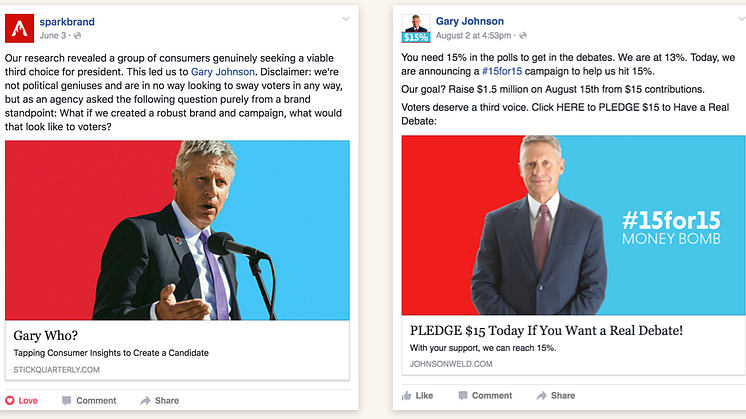
News -
Is it idea theft when you give someone an idea without expecting compensation?
If imitation is the sincerest form of flattery, Tampa-based advertising firm Spark has just received a veritable love letter from the campaign of Libertarian presidential candidate Gary Johnson.
MediaPost carries quotes from Spark in the Florida media, saying the agency created the mock advertising campaign, published it in a newsletter and "even sent it to the Johnson campaign as a lark".
Spark didn't hear back, but you can imagine their surprise when the Johnson camp seemingly copied their campaign without acknowledgement. It seems the agency isn't going to sue because the ideas were, after all, just an unsolicited "creative exercise" (no response yet from the Johnson camp itself).
Now, as you know, PitchMark is all about deterring idea theft by putting recipients of your pitches on notice that you care about your intellectual property rights, and that you are prepared to defend them.
But is it still idea theft if you are giving away the idea for free?
This example strikes at the heart of the issue of idea theft. An idea is worth nothing if no one is generating any benefit from it. But as soon as someone does, all of a sudden it becomes the most important thing in the world. Similarly, while the Johnson camp did nothing with it Spark wasn't concerned. It was only when the campaign implemented it that they cried foul.
Think about that next time you send an idea in an email or a "naked PDF" to a prospective client or investor, without having PitchMarked it. What happens if they take off with the idea, and the idea takes off?
If, by some miracle, Gary Johnson beats both the Democrat's Hillary Clinton and the Republicans' Donald Trump and wins the presidency - or even comes a close third - Spark might be able to claim its campaign was the driving force. But that's a long, circuitous wait for a return on the investment.
Even then, it's possible Johnson might claim to have created the advertising campaign himself, and that Spark was the one to have copied it after Johnson launched it.
All of this shows two things:
- Ideas are worth something - how much, depends on what the recipient does with it. And
- The time of creation becomes critically important - for Spark to claim they created the campaign, and to fend off any rebuttal from the Johnson camp, they will have to prove they came up with it first.
Bottom line: if you're ever tempted to pitch your ideas without expecting payment - but also don't want to remain uncredited if your idea really takes off - the least you could do is PitchMark it.
